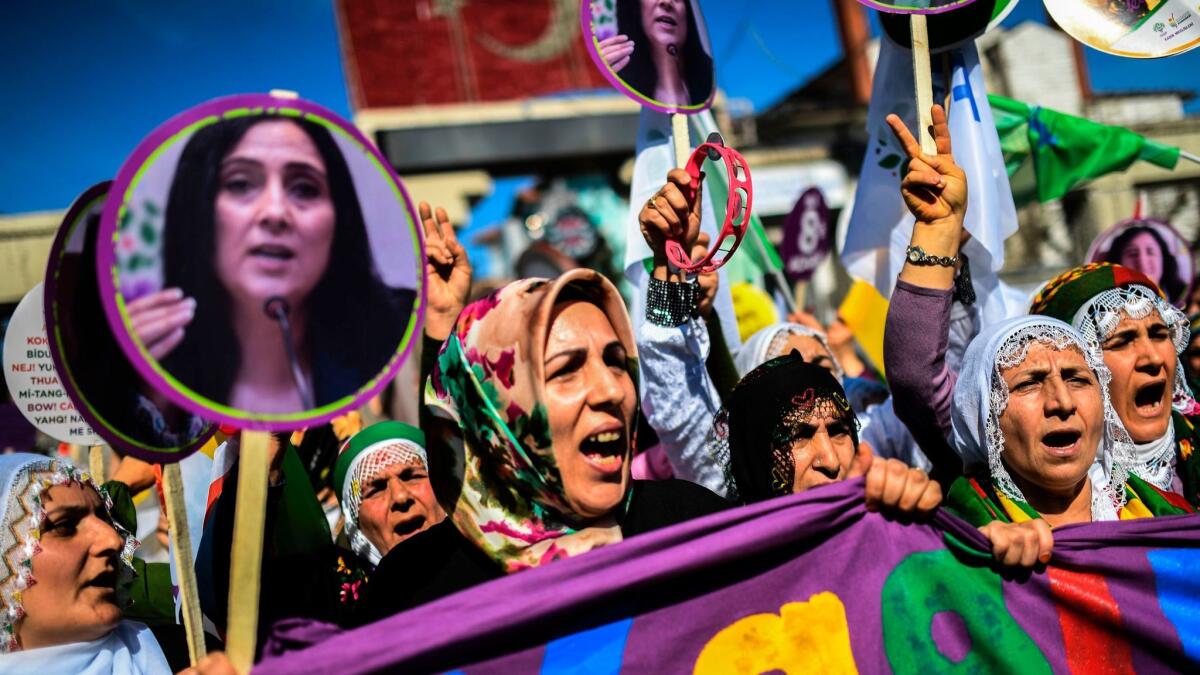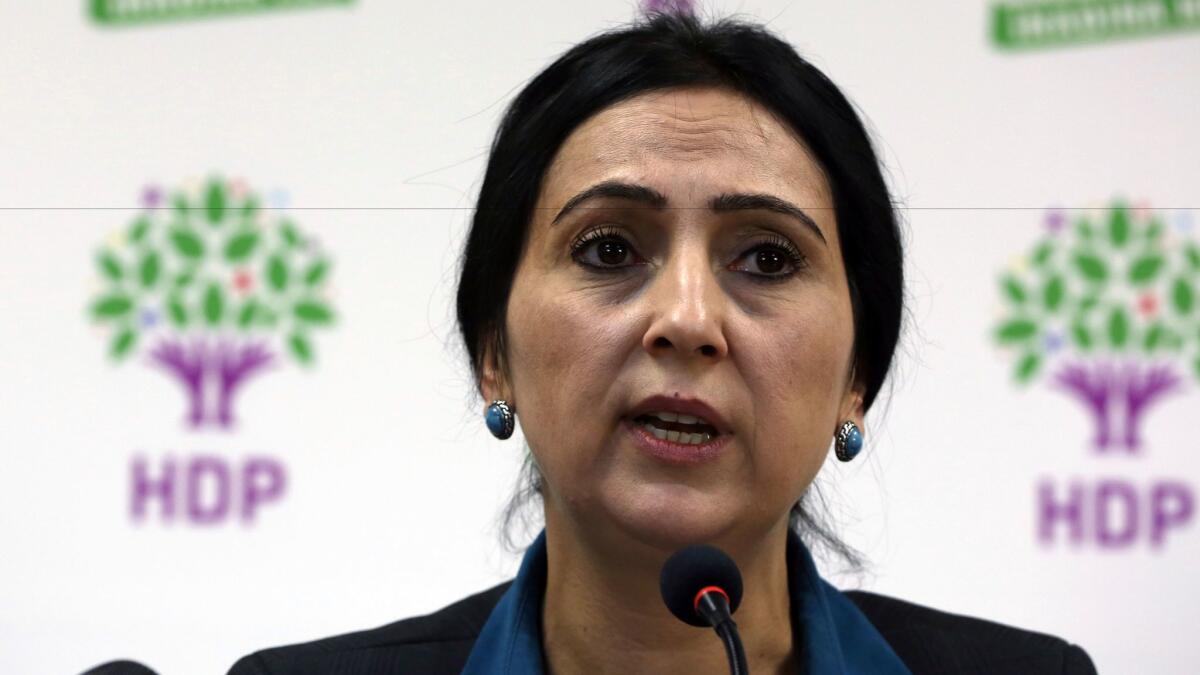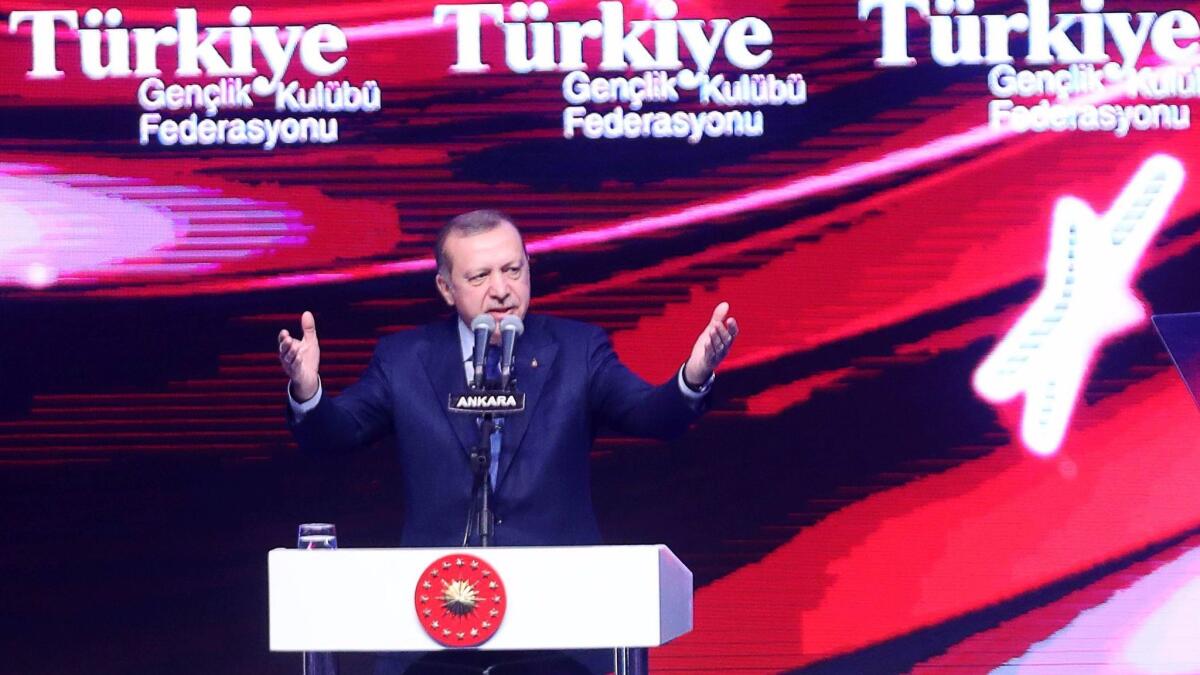As Erdogan consolidates power in Turkey, the Kurdish opposition faces crackdown

- Share via
Reporting from Istanbul, Turkey — She is facing a potential sentence of 83 years in prison. The crime, some would say, is belonging to the political opposition that is under siege by Turkish President Recep Tayyip Erdogan.
Figen Yuksekdag, co-chair of the country’s leading pro-Kurdish political party, is among the most prominent targets of a massive legal assault on Turkey’s Kurdish opposition in the run-up to a vote on a constitutional amendment that could grant Erdogan sweeping powers.

The government has already stripped her of her seat in parliament for allegedly supporting the outlawed Kurdistan Workers’ Party (PKK). She stands accused in scores of other terrorism-related cases — as does her co-leader of the People’s Democratic Party (HDP), Selahattin Demirtas, who has been sentenced to five months in prison for “insulting the Turkish nation.”
Among Yuksekdag’s alleged crimes: delivering a speech in 2015 that lent support to Kurdish militias battling Islamic State in Syria, and attending the funeral of a suspected leftist militant in 2012.
Using emergency powers in place since last July, Turkey has jailed 13 HDP lawmakers and more than 5,000 of the party’s workers over alleged terror links. In the Kurdish southeast, where the HDP enjoys an electoral majority, more than 80 locally elected district governments have been replaced by federally appointed caretakers, their former heads imprisoned.
In addition, dozens of news outlets have been shuttered, scores of journalists arrested, and art exhibits and cultural festivals have been banned for allegedly supporting the PKK.
The crackdown has gutted what was once touted as a political bloc that could help end the PKK’s four-decades-long insurgency, which has claimed 40,000 lives.
“The government is totally turning everything upside down,” said Ahmet Yildiz, an author of several books on Turkey’s Kurdish political movement and a researcher at the Istanbul-based Al Sharq Forum. “Some [of those accused] have affiliations with the PKK, but not all of them …. It all depends on how you define terror, and the government is using a political definition of terror.”
Up to 20% of Turkey is ethnically Kurdish, but the minority has long been subject to restrictions on cultural expression, stoking tensions that gave birth to a leftist separatist insurgency by the PKK in 1984, led by the now imprisoned leader Abdullah Ocalan.
Erdogan’s government enacted significant reforms, and the PKK agreed to a cease-fire in 2013. But the truce unraveled in 2015 after Turkey refused to militarily intervene in Syria on behalf of Kurdish militias who saw Ocalan as a figurehead and sought to carve out a separate state.

Erdogan views the Kurdish militias in Syria to be extensions of the PKK, which both Turkey and the United States consider a terrorist organization. In her 2015 speech, Yuksekdag said that while the government believed her party was “leaning on a terrorist organization,” she saw no harm in supporting the militias, which have been the most effective foes of Islamic State in Syria.
She has defended her attendance at the 2012 funeral as an attempt to acknowledge the grief of mothers in her constituency. Her supporters have pointed to a 2009 speech in which Erdogan ignited hope of a political solution to the PKK insurgency by speaking of the pain of mothers who lose their children. “Mothers have no ideology. Mothers have no politics, they are not rightists or leftists,” he said.
At the time he made those remarks, Erdogan had enlisted Kurdish opposition figures as mediators with the PKK’s head, Ocalan.
One such mediator was Ahmet Turk, a veteran Kurdish politician currently with the Democratic Regions Party who has lived through nearly three decades of what amounts to a revolving door between parliament and prison. He now doubts Erdogan ever sincerely wanted peace.
“Not Erdogan, not any of the governments internalized the Kurds’ identity problems, or their requests for education in their mother tongue,” said Turk, currently deposed from his job as mayor of Mardin and facing terror charges for alleged involvement in a regional Kurdish confederation inspired by Ocalan.
The accusations, Turk said, “are aimed at trying to make the Kurdish political movement fail. They are political decisions …. The government is nitpicking, they have no solid evidence.”
The case against Turk is centered on wiretapped phone recordings and a secret witness, the same kind of evidence used against Kurdish leaders under previous military-dominated governments that have banned five pro-Kurdish parties in the nation’s history over alleged ties to terrorism.
Even Kurds who have usually been allies of Erdogan’s Islamist movement find themselves in the snare.
One of Erdogan’s most regularly touted political achievements is the lifting of a ban on women wearing headscarves. Huda Kaya, an HDP lawmaker who once faced the death penalty for protesting the ban, now finds herself being accused of terrorism for a speech that sought to bring attention to alleged abuses by the military in the southeastern district of Diyarbakir.
When reports emerged of civilians dying as a result of a months-long curfew imposed as the military battled PKK militants, Kaya traveled to the area and gave a speech saying, “We are witnesses to the massacres here. We know very well who killed whom.”
Prosecutors are seeking to jail Kaya for up to 25 years for the statement, which they say “glamorized” the PKK’s narrative.
“There were dead bodies in the streets, left alone to rot because of a curfew,” Kaya said. “Neither in humanity nor in Islam is there any place for that kind of barbarity. I only went there to call for peace, and now I face accusations of being a terrorist.”
Farooq is a special correspondent.
ALSO
Turkey’s bleak media scene: Arrests, closures and closed trials
Fearful immigrants in U.S. make perilous winter crossing to seek protection in Canada
The teachers are unpaid and danger is ever present, but Mosul’s schools are reopening
More to Read
Sign up for Essential California
The most important California stories and recommendations in your inbox every morning.
You may occasionally receive promotional content from the Los Angeles Times.










